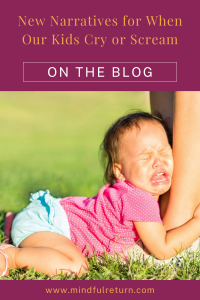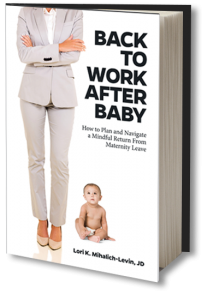 When our babies and children cry or scream, it can sometimes feel like the whole world is about to end, no? That’s how it has been for me, anyway.
When our babies and children cry or scream, it can sometimes feel like the whole world is about to end, no? That’s how it has been for me, anyway.
One thing I’ve come to know about myself is that I’m quite sensitive to the thoughts, sounds, ideas, and opinions swirling around me. It’s why I don’t watch or read much disturbing news. Watch horror movies. Or read thrillers.
Consciously limiting disturbing inputs is great and healthy for boundary-setting and sanity. But it’s not exactly something you can do easily when the disturbing inputs live in your house!
What to do, then, when a parent’s nervous system is repeatedly being activated by baby or kid-related outbursts?
For me, I had to learn why crying or screaming was triggering me so much. Which led to my asking the question: “what story am I telling myself when my little one cries or screams?”
I’ll be honest. I don’t like this topic. I don’t like thinking about it. Or talking about it. Or writing about it. Crying and screaming are some of my least favorite parts of parenthood (that and potty training), likely in large part because they usually bring up memories of trauma and feelings of shame for me.
So why bother to write this post? Well, I’ve learned that if I’m feeling shame or discomfort around a topic, others probably are, too. And I know that shame dies in the light of being shared.
Note: I’m not a therapist. Or a child development expert. Or a social worker, or a neuroscientist, or a pediatrician. I’m just a working parent, writing from her own observations here.
What Stories Do You Tell Yourself When Your Child Cries or Screams?
When I first walked into our later-to-be-beloved daycare center, I was struck by how unfazed the teachers were by the noises of the baby classroom. They were compassionate, caring teachers who were professionals in their field. And crying was just part of the normal work backdrop.
I, on the other hand, was triggered by the tears. It took me a long time to realize that what got to me – whether in my own home, or at daycare – wasn’t the screaming itself (all kids cry and scream!). Rather, it was the stories I was telling myself about the screaming.
In my family of origin, yelling (by grownups) was correctly correlated with danger. With a lack of safety. And ultimately with abandonment. So it made sense, once I thought about it, that I would carry those stories of what yelling meant into adulthood.
When I learned to ask what story was going through my own head, it usually carried a theme of not doing something right as a parent. I’m not meeting my child’s needs. I’m making the wrong choice. It’s my fault the child is crying. Or I should be doing something other than what I’m doing right now.
It turns out, though, that there are many reasons small human beings cry, scream, and yell. None of which has anything to do with an actual lack of safety or an unhealthy behavior on my part.
I can be doing absolutely nothing wrong as a parent or human in the world, and my child will still scream.
Infants cry because they are hungry, tired, gassy, sick, in pain, uncomfortable…and a million other things. They don’t have words, so screaming is how they get our attention and communicate.
Toddlers often scream because they have strong emotions. They want to be more independent than they are physically capable of being. Sometimes they are sad. Or jealous. Or mad. As humans, they feel all the things.
And older kids scream for any number of reasons, including anger, frustration, perceived injustice, pain, fear, exhaustion, anxiety, and their own neurological wiring.
These aren’t complete lists. And yes, of course, our children would also likely scream if we were putting them in danger or truly abandoning them.
I’m going to give you the benefit of the doubt here, though, and assume that those of you reading this don’t fall into the “danger or abandonment” categories with your children. So other than “my child is screaming so I must be doing something wrong and need to change my own behavior right now,” what else can we be telling ourselves?

Healthier Narratives for Us to Tell Ourselves as Parents
If I’m going to decide not to blame myself for the crying, what can I tell myself instead?
Two reliable mantras that have gotten me through many a kid meltdown have been:
- A chant of “underdeveloped prefrontal cortex!” (Did you know the brain’s prefrontal cortex isn’t fully developed until age 25?!)
- Repeating to myself, “His brain is on fire right now. His brain is on fire.”
Both of these statements help take me and my own self-blame – or a desire to fix the situation as fast as humanly possible – out of the picture.
For a baby, it can be helpful to say to yourself, “Aw, little one. This is how you communicate. One day you’ll be able to tell me what it is you are feeling.” For a toddler, perhaps it’s “I see you. It’s hard to have such big emotions at that age. This is developmentally appropriate. This too shall pass.” And for older kids, “I’m curious what’s causing this. When he gets into a calmer place, I can ask him.”
And finally, what about specific scenarios?
For tears upon separation, I like to remind myself, “this isn’t what abandonment looks like.” (More here: No, Working Mom, You’re Not Abandoning Your Child. Here’s Why.)
And for those times when you get the nasty glare and side-eye from onlookers, I’ll quote the wise Kuri Yasuno, author of Autism with a Side of Sushi. “I’ll process that lady later,” she tells herself when someone else has a negative reaction to her child’s behavior.
Does any of this resonate? What healthier stories have you found to tell yourself when your own little ones trigger you? Please share below in comments, so that together we can stop the internal self-blame. And extinguish shame with the light of shared experiences.
Want more practical tips on working parenthood? Check out my book, Back to Work After Baby: How to Plan and Navigate a Mindful Return from Maternity Leave



This is perfectly timed! My son was having a major meltdown this morning because we said no to TV. Tears and acting out. We thought it meant he was addicted to TV and we were bad parents for letting him watch so much. When we finally got him to calm down and eat breakfast he was okay to play and not watch TV. His meltdown and tears were about being hungry in the end. It’s so hard to not overthink parenting decisions and feel bad about them but sometimes it’s just that kids don’t know what they need and act out. It’s nice to see here we’re not the only ones effected and thinking deeply about tears.
So glad this resonated for you, Jessica. And what a perfect example in real life – thank you for sharing in detail! We can, I truly believe, benefit from being much kinder to ourselves as parents…and the tears and screaming provide so many opportunities for us to practice that. You are absolutely not alone on this one.